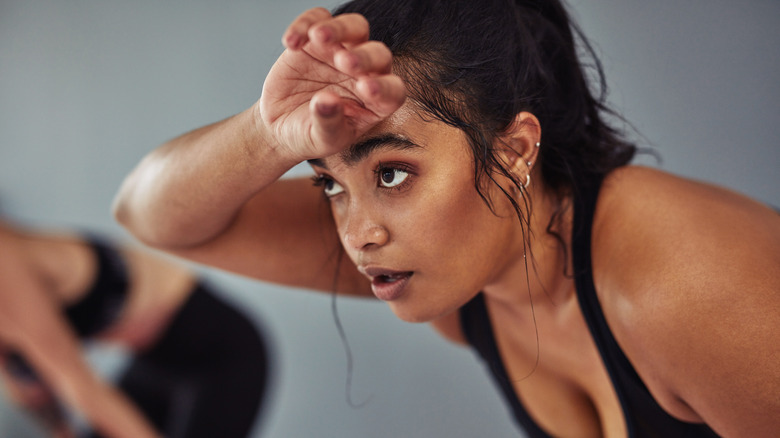The Best Type Of Workout To Prevent Overeating
Exercise and a healthy diet are two keys to maintaining body weight. Even if you splurge on your diet every once in a while, you might tell yourself you'll exercise a little more that week to burn off the excess calories. Yet that extra spin class might have you starving for carbs later that day. Or maybe not.
Certain types of workouts can affect the hormones that regulate your appetite, according to a 2023 study in the Journal of Applied Physiology. The study tested the appetite hormones before and after three types of workouts and a rest day (as a control) on nine middle-aged adults. One workout was running easy for 30 minutes. Another workout was a 20-minute high-intensity treadmill session with 10 one-minute efforts followed by a minute of rest. Another high-intensity workout was eight 15-second all-out efforts on a stationary bike, followed by two minutes of rest after the hard efforts. Compared to the rest days, the high-intensity workouts suppressed acylated ghrelin, which is a hormone that makes you feel hungry.
How exercise affects your appetite
However, the researchers didn't find that any of the workouts made people eat less. None of the workouts affected people's perception of their appetites. The workouts also didn't have any effect on the peptide YY hormone (PYY), which decreases appetite, or the glucagon-like peptide-1 (GLP-1) hormone, which signals to your brain that you're full. The high-intensity efforts did increase the levels of lactic acid in the body, and the researchers concluded that it's the lactic acid that lowers the acylated ghrelin.
Other studies have looked at the role of lactate in suppressing appetite. A 2020 study in the Journal of Applied Physiology had men complete 10 one-minute hard cycling efforts followed by one minute's rest after taking sodium bicarbonate to stimulate lactate in the blood. Higher levels of lactate in the blood resulted in lower levels of acylated ghrelin and increases in PYY and GLP-1 hormones. In other words, if your workouts are hard enough to stimulate lactic acid in your system, they will help tame your appetite.
Appetite suppression doesn't last long
One thing to note in the two previous studies is that the researchers measured these hormones that affect your appetite just after the workouts and up to 90 minutes post-workout. According to a 2023 study in Appetite, exercise's effect on your appetite is only temporary, meaning that your appetite goes back to normal levels a few hours after exercise. Later in the day, you might take in more calories to catch up. However, the energy deficit you create through both exercise and the pause in your appetite might be more manageable for your willpower than just through diet alone.
People also respond differently to the appetite-suppressant effect of exercise. People with genetic factors such as the fat mass and obesity gene might benefit more from the ghrelin-reducing effect of exercise, according to a 2019 study in The American Journal of Clinical Nutrition.
Although high-intensity exercise might be the better choice for its appetite-reducing effects, make sure it's on land. According to a 2023 study in Appetite, water-based exercise increases your appetite after exercise, particularly if you swim in cold water.



